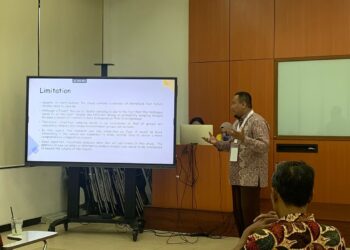Some time ago the tax boycott became a trend among social media activists. Indonesian netizens were furious at the behavior of a tax official’s son who was involved in a case of molesting a minor, causing him to become critical. Public anger lies not only in the act of abuse, but also in the hedonistic behavior of the child who likes to show off assets worth billions of rupiah on social media.
Some netizens were disappointed and thought that the taxes they paid were only used to support the extravagant lifestyle of tax officials. On the other hand, the government stated that as of early 2025, the Value Added Tax rate will increase to 12%.
Many opposing opinions welcomed this policy. Observers stated that the VAT increase has the potential to increase the prices of people’s necessities, the impact of which will be felt most by the lower middle class.
Even though there are many events that make people increasingly antipathetic towards taxes, we cannot deny the fact that many groups of people are helped by the taxes we pay.
1. Definition of Tax
In their book Taxation: Philosophical Perspectives (2018), Martin O’Neill and Shepley Orr state in the introduction that taxation is “irreducibly normative matter, and one which implies a number of our concerns of social justice. When we think about issues of social justice in practice , we cannot avoid thinking at the same time about tax” (page 2). Through this statement, Martin O’Neill and Shepley Orr want to convey that tax is a basic idea that must be present and cannot be avoided in discussions regarding policies oriented toward social justice.
2. Four Philosophical Values in Tax
From the two definitions above, a simple conclusion can be drawn that taxes have many basic values and are the spirit of the ideals of prospering society. It is important for anyone to know the philosophical values that form the basis of the tax system that has existed to this day. So that these philosophical values are not forgotten, we summarize them in the Four philosophical values of taxation.
a. Philosophy of Justice
one of the main philosophies that forms the basis of the essence of taxation is justice. The question that arises is whether the tax system implemented is fair for all citizens? The concept of justice in taxes can be divided into several aspects, such as distributive justice, proportional or progressive justice, and commutative justice. Discussions about who should pay taxes, how much tax they should pay, and how these taxes should be distributed are some of the discussions discussed in this justice approach.
In Indonesia, several tax systems adopt progressive justice. Simply put, progressive justice means imposing higher tax charges on higher incomes. For example, the Article 21 Income Tax (PPh) system applies a progressive system with a rate range from 5% to a maximum of 35%.
Even though in many cases Indonesia adheres to the values of progressive justice, in several types of taxes, Indonesia still adheres to a system of proportional justice. The Value Added Tax (VAT) system is an example. Proportional Justice is a system where taxes will be levied in the same amount on everyone regardless of a person’s economic abilities.
Meanwhile, the philosophy of tax justice will also give rise to terms such as commutative justice and distributive justice. The meaning of commutative justice is the treatment of someone without looking at the services they have provided. In practice, Indonesia also adheres to the values of commutative justice. This is in accordance with the definition of tax stated in Law No. 28 of 2007 (UU KUP), where even though we pay tax, we do not get any form of compensation.
b. Philosophy of Usefulness
This philosophy emphasizes the benefits provided by taxes to society or the country as a whole. The question that then arises is whether the taxes paid are allocated to finance public services that provide benefits to the entire community, such as education, health, infrastructure and social protection. In other words, the philosophy of usefulness emphasizes the efficient use and effectiveness of tax allocation, as well as other fiscal policies to achieve social welfare.
Meanwhile, according to Law No. 28 of 2007 concerning General Provisions and Tax Procedures (KUP), tax is defined as “a mandatory contribution to the state owed by an individual or entity that is coercive based on the Law, without receiving rewards directly and used for state needs for the greatest prosperity of the people.”
From the definition of tax according to the KUP Law, it can be concluded that tax is a form of coercive contribution from citizens without any reward, which is later used for state needs for the purpose of prospering society. For this reason, the definition according to the KUP Law has enlightened us as taxpayers, if we are part of efforts to prosper society.
The definition of tax in the KUP Law also makes us aware that with income or additional assets that we have and have reached the minimum limit to be taxed, we will indeed be forced to pay tax without any compensation. Nevertheless, we have become part of efforts to prosper a society that is not yet prosperous and need a touch of usefulness from the taxes we pay.
c. Compliance Philosophy
This philosophy highlights the importance of emphasizing the values of compliance with tax rules in maintaining the integrity of the tax system, as well as in efforts to increase taxpayer compliance in paying taxes. The question that arises then is how the tax system can be designed in a way that encourages taxpayer compliance without burdening them excessively.
This involves ethical and moral considerations regarding individual responsibility to pay taxes in accordance with legal provisions. Discussions about compliance philosophy can give rise to other discussions such as discussions about tax avoidance and tax evasion.
d. Philosophy of Responsibility
This philosophy emphasizes the government’s responsibility in managing the tax funds we pay. The question that arises then is how the government uses tax revenues, emphasizing the values of transparency and accountability. The concepts of accountability and transparency are important in this approach so that the public can understand how their tax money is used and monitor its use. In this way, people can have confidence in the taxes they pay to the government.
In practice, tax systems often reflect a combination of several of these philosophical approaches. The aim is to achieve a balance between justice, benefit, compliance and accountability, so as to create an ideal system and be able to increase public confidence in the taxes they have to pay.
Reference :
UU No.28 Tahun 2007 tentang Ketentuan Umum Perpajakan












